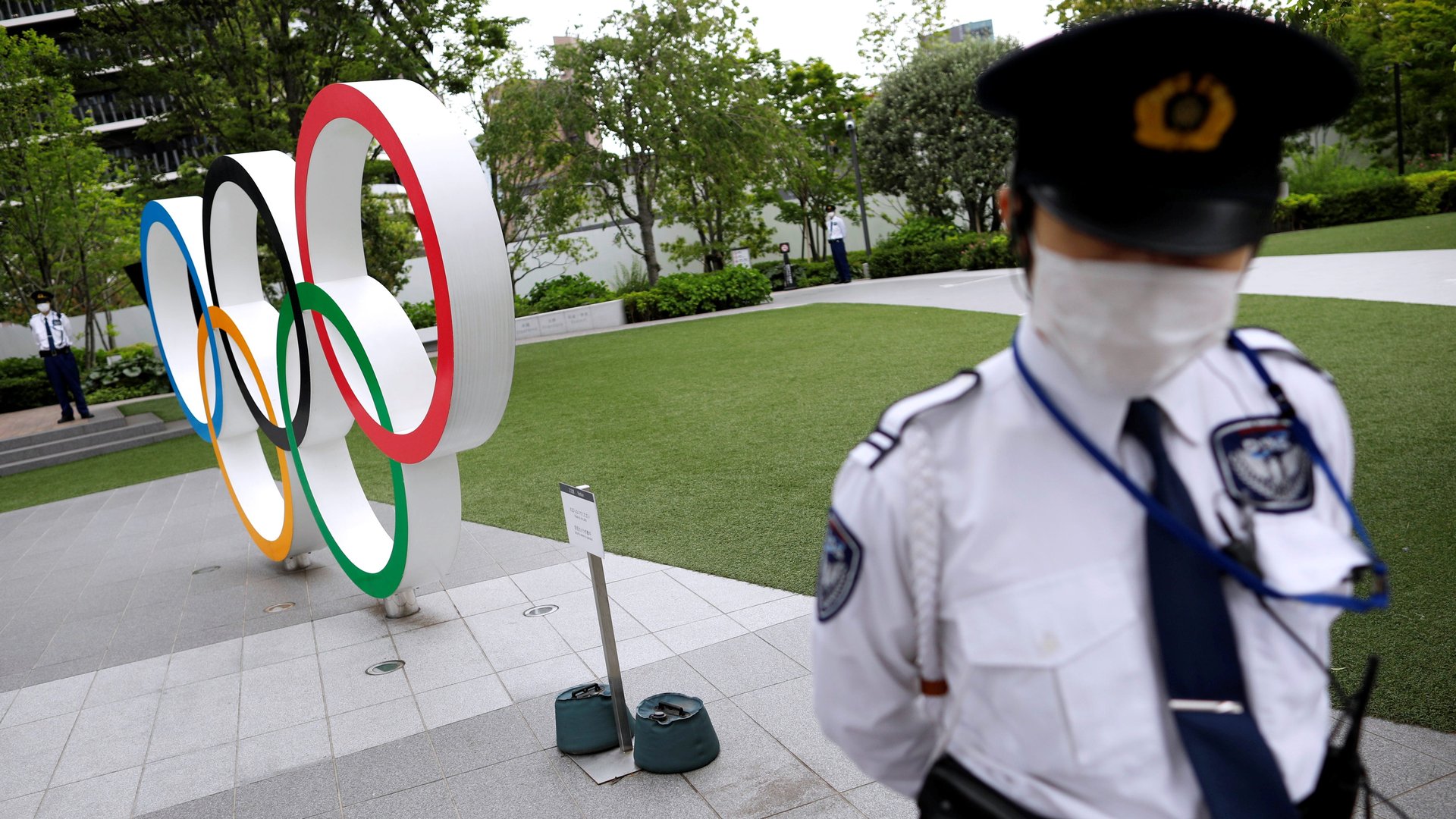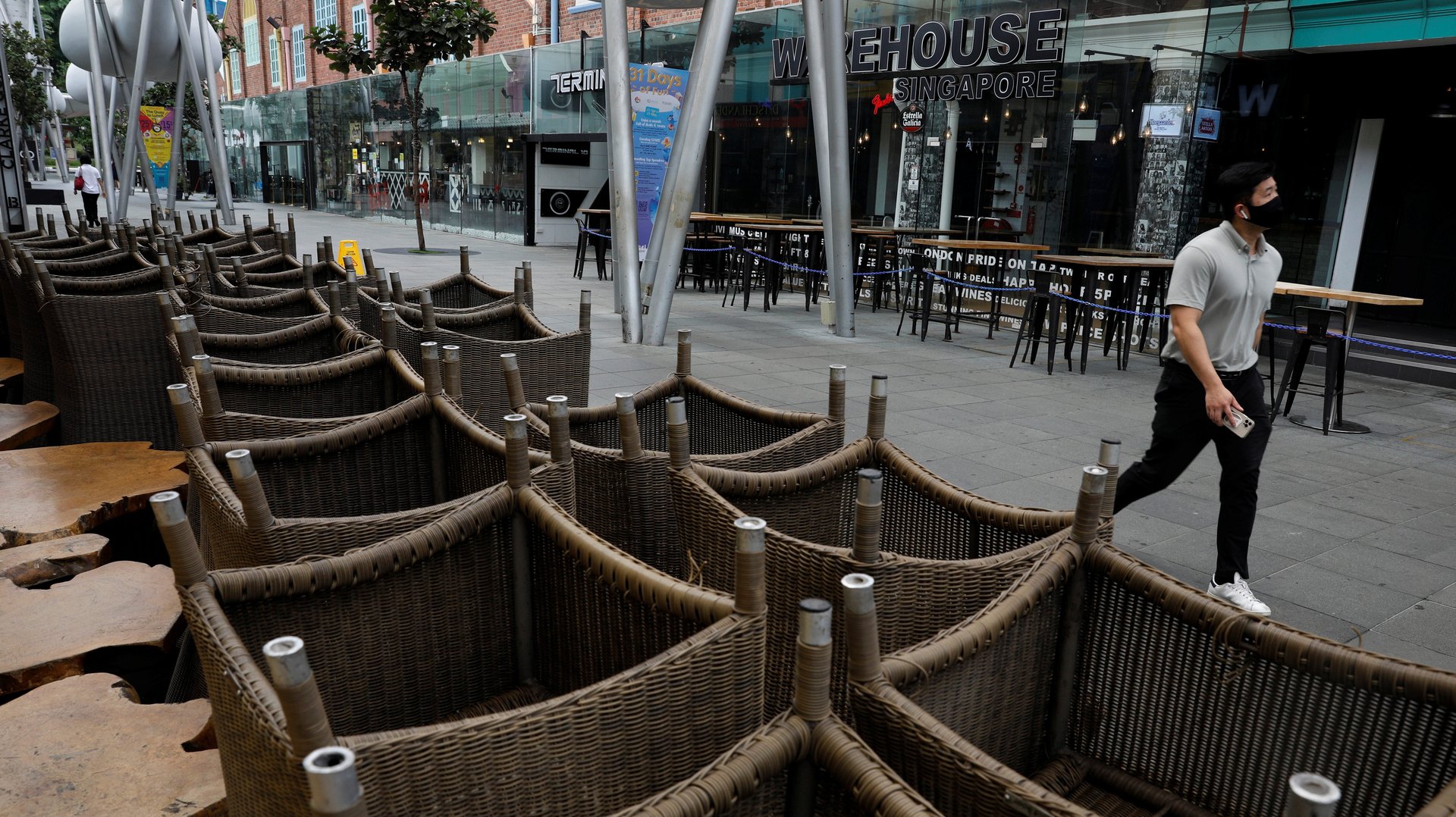Singapore and Taiwan’s Covid-19 spikes are bad omens for Japan’s Olympics
With many countries across Asia experiencing rises in Covid-19 cases, Davos-in-Singapore is off—the World Economic Forum canceled its special summer event there as the southeast Asian city-state grapples with a new Covid-19 outbreak. And Taiwan has lost its nearly Covid-free status and instead appears to be heading for its first lockdown of the pandemic.


With many countries across Asia experiencing rises in Covid-19 cases, Davos-in-Singapore is off—the World Economic Forum canceled its special summer event there as the southeast Asian city-state grapples with a new Covid-19 outbreak. And Taiwan has lost its nearly Covid-free status and instead appears to be heading for its first lockdown of the pandemic.
In both Singapore and Taiwan, the clusters began around airports, and then spread from airline staff and airport workers into the broader community. In the case of Taiwan, the problem was compounded by a slow vaccine rollout.
Both countries are often held up as examples of highly effective pandemic response, which is why the twin travel-linked spikes in Covid-19 cases underscore public health experts’ misgivings about the wisdom of holding the Olympics in Japan in just two months.
Japan under pressure
In Japan, too, vaccination rates are negligible with only around 3% of people having received a first shot, and many parts of the country, including host city Tokyo, are under a state of emergency as cases have risen in recent weeks. Daily new infections were again above 5,000 on Tuesday, after dipping earlier in the week. Many are calling for a national state of emergency, and thousands of doctors are among those urging the games be canceled.
If the world’s most powerful people don’t think they can safely pull off a small-scale in-person event in Singapore, where a quarter of residents are fully vaccinated, that really doesn’t bode well for the Olympics. The Games would bring in thousands of athletes and officials from a mix of high- and low-risk countries.
“Japan is in a very difficult position,” said Hsu Li Yang, an infectious diseases expert at National University of Singapore’s Saw Swee Hock public health school. “With more transmissible variants circulating in a world where the majority of countries have not achieved adequate vaccination coverage, it will certainly be challenging to host large events like the Olympics without transmission of the virus, despite all the precautions laid out in the Playbooks.”
Singapore’s Changi Airport cluster

As of this week, Singapore’s schools have shifted to online learning, dining in is barred, and group outings can now include no more than two people. The city-state imposed the fresh restrictions after an increase in cases among Changi airport staff, including many cleaning workers, who were deployed around arrival zones through which passengers from high-risk countries had transited. Infected workers then appear to have spread the virus onwards by going to eat at a food court at Terminal 3 that was open to the public because the airport tried to bolster revenues with dining and “glamping” promotions.
It quickly became the largest cluster in the country, with close to 90 cases, despite the government having lengthened quarantine periods for arrivals from countries including India and the UK in April.
“These events highlight the increased risk associated with the new Covid-19 variants of concern,” says Hsu. “Human errors, fatigue, and complacency will occur.”
Non-passenger access to airport terminals has been suspended and Singapore will also segregate arrival zones, including baggage belts and toilets, and staff handling high-risk and low-risk arrivals.
Sequencing has shown that many of the cases were of the B.1.617.2 variant, a subtype of a strain first seen in India that is believed to spread more easily. The variants the world is battling this year do change things, said Dale Fisher, a senior consultant for infectious diseases at Singapore’s National University Hospital.
“What we might have gotten away with a month or two ago, we’re not getting away with now,” said Fisher. “We have to start to question, given that a superspreader event is now more likely, are we sure we get a lot of benefit from having face-to-face meetings this year?”
Taiwan’s pilot and airport hotel outbreak
About a month ago, an airport hotel in Taiwan—which bills itself on its site as “Your Gateway to the World”—began offering a promotional package for people who were missing travel. For NT$3,000 a night (US$100), a flock of Taiwanese tourists stayed at the Novotel hotel located next to Taiwan’s biggest international airport, enjoying views of planes taking off and landing.
Little did they know, they were staycationing in the same building as airline staff returning from overseas. At the same time, the government relaxed quarantine periods for flight crews to just three days. (By comparison, Taiwan imposes a strict 14-day quarantine period on all other arrivals.) Soon, dozens of pilots and flight attendants, as well as hotel workers, started testing positive for Covid-19. Then people without a clear connection to those workers or the hotel began testing positive. Now Taiwan has reported more cases this month alone than it did for the rest of the pandemic, many linked to a variant first seen in the UK.
The hotel, which has since been fined, didn’t respond to questions from Quartz.
Taiwan saw early success at stamping out the virus, allowing its economy to grow last year while life on the island stayed largely unperturbed during most of the pandemic. However, that same success lulled Taiwan into complacency, allowing Covid-19 to quietly slip in through the porous border—the island’s only line of defense.
Contact tracing had dropped off—and some local clusters revolved around “hostess” clubs whose clients and workers might be reluctant to be traced. Added to that, vaccines have been in short supply given Taiwan’s unique geopolitical situation. As China holds that the independently-ruled island is part of its territory, Taiwan has few formal and informal allies, complicating the process of procuring vaccines. It’s possible that some doses may be forthcoming from the US, with which it historically has had close ties, but so far, only a tiny share of the population has been vaccinated.
“Had all pilots and flight attendants [been] fully vaccinated, most likely the current outbreak would not have happened,” says professor Chunhuei Chi, the director of Oregon State University’s Center for Global Health. “No matter how successful a country is in controlling the pandemic, as long as the world is not safe, no country is safe.”
Olympic roulette?
Humans aren’t built for eternal vigilance. The virus will sneak through loopholes in the safety measures for athletes, such as daily testing and bans on spectators. And when it comes to vaccines, while many countries are prioritizing Olympics athletes, it’s not a requirement for attending. Nor is it clear how widely local organizers who will interact with the international arrivals will have been vaccinated.
While no planning can reduce Covid-19 risk to zero, it’s possible a little too much is being left up to chance.
“If you have athletes and support teams coming in from all over the world there is an absolute guarantee that one of them is going to be infected with Covid-19. Then you’re relying again on the systems in place…to essentially weed these people out and isolate them till they recover,” says Siddharth Sridhar, clinical assistant professor at the University of Hong Kong’s microbiology department. “But before that, you do run a risk of producing an outbreak somewhere. If you’re lucky, it’s within a so-called ‘biobubble.’ But if you’re unlucky, it spills out into the community. It depends on luck.”